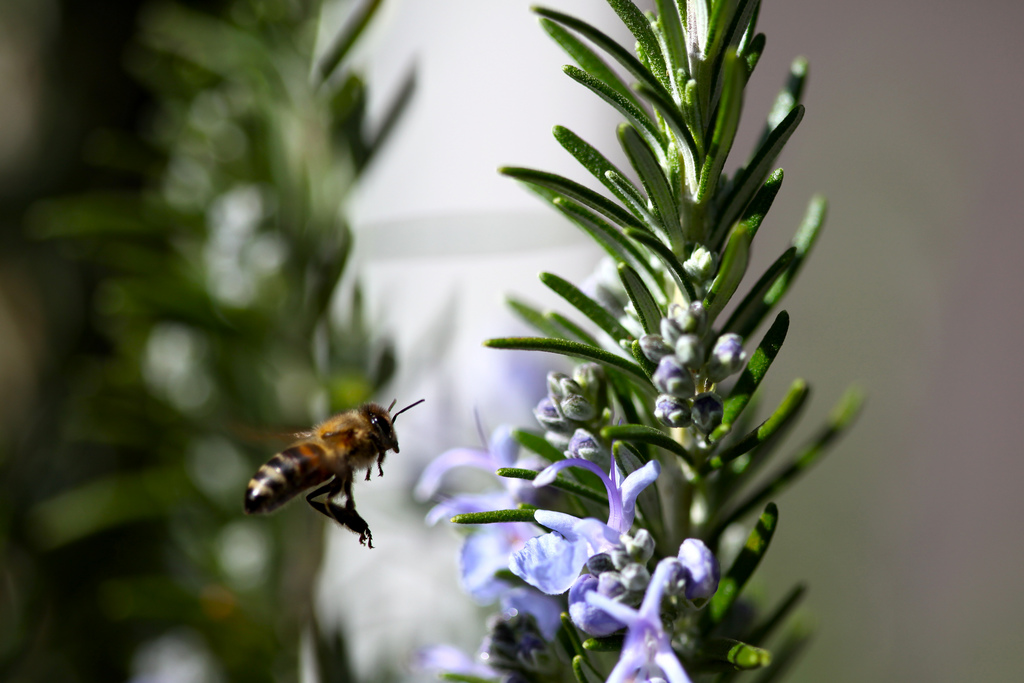The above image is from The Bodleian Library’s eleventh-century manuscript of the Pseudo-Apuleius from St. Augustine’s Abbey in Canterbury that includes a depiction of rosemary: folio 21r
There’s rosemary, that’s for remembrance. - Ophelia in Shakespeare’s Hamlet, Act IV, Scene V
In the Elizabethan days of Shakespeare and long before, the herb rosemary has been hailed as having amazing properties in the area of boosting memory. European traditionalists often put rosemary sprigs in the graves of loved ones to symbolize the cherished memory of them. English literature from the 16th century referred to Rosemary as a complete body cleanser. When skin was washed in rosemary water, it was radiant. Taken internally, it could cleanse the heart and brain as well as purge gout.
Many examples of the common knowledge of rosemary’s benefits can be found throughout ancient times. During the reign of the Greek empire, students would wear necklaces of rosemary or weave it into their hair to boost memory. In Roman times, their gardens contained rosemary and was a symbol of good character as it warded off evil spirits. Ayurvedic medicinal history documented rosemary use for enhanced thinking while Traditional Chinese medicine utilized it to treat headaches.
During the outbreak of the bubonic plague during the medieval times, people were said to have warded off the disease with use of the legendary thieves oil which contains rosemary. More recently, rosemary was used in hospitals in World War II as an antiseptic.
Fast forward to modern times. Clinical studies have shown many natural medicinal qualities that make rosemary a must in the Cog garden. There is indeed scientific evidence to show rosemary improves memory in healthy adults as well as in elderly people suffering from the effects of Alzheimer’s (studies linked here and here and here.)
I was very pleased to add another substance to the war against the toxic soup that attacks our natural defenses as rosemary is an antibacterial proven effective against numerous food related pathogens and therefor is effective in food preservation. Rosemary is typically used in the kitchen to season many meat dishes and for good reason because it destroys harmful organisms in meat while supplying bountiful anti-oxidants in the process. A recent study even shows a smidgen of rosemary can prevent carcinogens from forming when grilling meats.
A wonderful addition to skin care, rosemary water is purported to clear acne and leave skin more radiant. It is used to stimulate hair growth and promote healthy scalp and hair. Here is a wonderful article with recipes for homemade rosemary shampoo, rinses and hair treatments.
In addition to cooking with it, rosemary can be used dry or fresh to make teas, tinctures or infusions. It is also highly effective in its extract and essential oil forms. Just inhaling the rosemary essential oil deeply can bring about a measurable effect by reducing stress levels and altering moods. http://www.ncbi.nlm.nih.gov/pubmed/23833718 and http://www.ncbi.nlm.nih.gov/pubmed/19258850
**PLEASE NOTE that rosemary can effect clotting and should not be inhaled or used when taking blood thinning drugs. Rosemary may also interfere with diabetic prescriptions and should not be used medicinally by pregnant women. http://umm.edu/health/medical/altmed/herb/rosemary
An evergreen in the mint family originally from the Mediterranean region, rosemary can be cultivated indoors in a sunny window. Outdoors, it can easily be grown into a shrub during a warmer season. While we are expecting very cold winter temperatures here this winter, I understand my newly raised rosemary shrub may survive the winter as it is a natural perennial. But it will need a heavy mulching. I will report back in the spring on the condition and survival of this and other perennial herbs I hope to keep alive for many years.

Great stories of rosemary for history and/or herbal geeks:
Galen, of ancient Rome, wrote of Rosemary. http://www.mariamilani.com/ancient_rome/Ancient_Roman_Medicine.htm
Napoleon was passionate about rosemary, an ingredient in his favorite scent, Eau de Cologne. http://www.georgianindex.net/Napoleon/Perfume/scents.html
Rosemary was purported to be brought to Britain by the Romans in the 8th century, to Spain when Charlemagne ordered his farms there to grow it and later to the New World by European immigrants. http://www.herbinfosite.com/?page_id=305
A wonderful legend of rosemary used by Queen Elizabeth of Hungary in the 1300s. http://www.patsybell.com/2011/12/19/rosmary/
The legend of Four Thieves Oil: http://www.secretofthieves.com/four-thieves-vinegar.cfm
Additional Resources:
http://www.adlunamlabs.com/History_of_Rosemary.html
http://umm.edu/health/medical/altmed/herb/rosemary
http://healthimpactnews.com/2014/study-rosemary-herb-reduces-cognitive-decline-in-elderly/
http://knowledge-sastha.blogspot.com/2012/10/dew-of-sea-rosemary.html
http://ayurvedicoils.com/tag/ayurvedic-health-benefits-of-rosemary-essential-oil


Sharing another way to remember Rosemary :)
I plan to make this into a “can-able” recipe soon so I can make from dried bean and just open a jar and serve.
“Braised” White Beans – A Zoe’s Kitchen Knockoff Recipe
What you’ll need (Serves 2 as generous sides in ramekins):
1 can white beans – rinsed and drained
1 Tbsp butter (or.. even better… ghee!)
1 1cm slice of small red onion, chopped (makes about 1/4 a cup)
3 cloves of garlic, crushed and diced
1 cup chicken stock (approximately)
1/2 teaspoon dried rosemary
2 Tbsp GOOD olive oil (and a pinch more for drizzling at the end)
Sea salt and fresh ground pepper to taste
How it’s done (Long) :
Drain and rinse your beans in a fine mesh sieve or colander. If you have the same experience I have with my beans, when the house is chilly the sauce in the bean can thickens up so you may have to scoop it out or just warm up the can in some hot water before opening. Rinse the beans thoroughly to get rid of the liquid (some fragments of broken beans may remain depending on the size of your holes, and thats okay). Rinsing the beans removes a lot of the stuff that gives you gas when you eat beans so get rid of it (for everyone’s sake)
In a small sauce pan heat up the butter on medium till it just stops bubbling (all the water is cooking off) and then add the diced onions. Saute in butter until soft and translucent.
Add garlic and rosemary and saute about 30 seconds (until fragrant). Then add your beans and chicken stock and olive oil. Stir to combine.
Allow to simmer and stir frequently to prevent bean burn on the bottom of the pan. This should thicken up quickly, however if it does not because you put in too much liquid, simply allow it to simmer a while longer. If it appears too dry, add more chicken stock. Taste the liquid periodically to adjust the salt and pepper seasoning. Remember to be careful adding the salt initially because you can over-salt easily, especially if you are using regular chicken broth instead of low sodium.
Once the consistency is thick enough to coat a spoon, and the flavor is how you desire it, it’s done!
I like to drizzle a little olive oil onto the top after dividing into ramekins because it looks pretty.
Shorthand:
Butter+Onions Med Heat Saute/Garlic + Rosemary 30s/Beans + Chicken Stock + Olive Oil simmer/S+P to taste/EVOO drizzle & serve